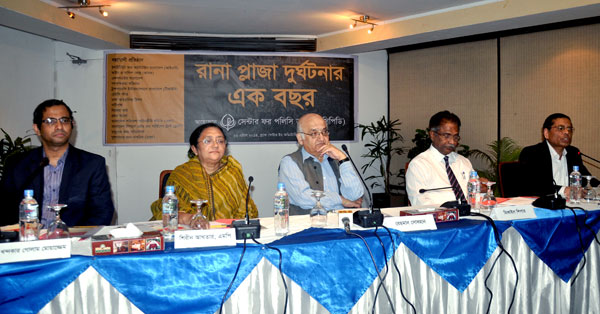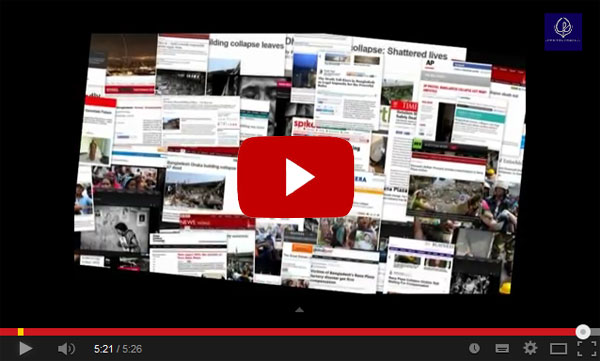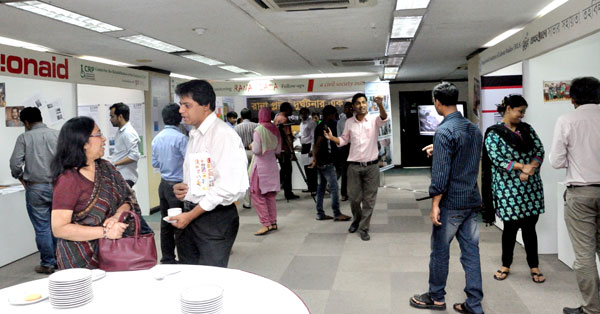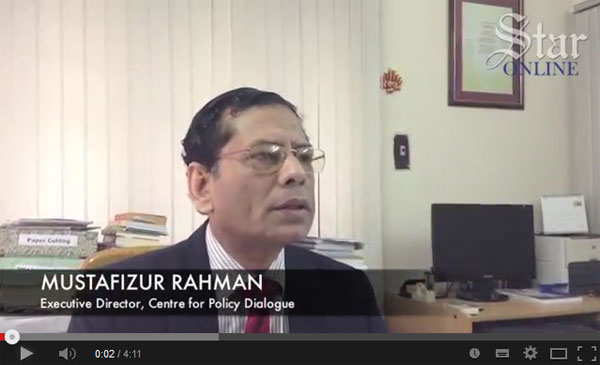Following one year since the Rana Plaza collapse, the victims are in need of long-term planning and support as regards compensation, treatment and alternative employment scheme.
Despite notable progress with regard to some of the immediate concerns, a coordinated plan and approach to address short, medium and long-term issues concerning the post-Rana Plaza follow-ups and the RMG sector are yet to be developed, observed discussants at the CPD dialogue titled “One Year after the Rana Plaza Tragedy.”

The dialogue was organised as part of the Post-Rana Plaza Monitoring: a Civil Society Initiative in partnership with a number of civil society organisations and eminent citizens, at the Brac Centre Inn auditorium in Dhaka on 23 April 2014.
Professor Mustafizur Rahman delivered the welcome address reiterating that the initiative seeks to keep the issue alive and monitor the status of the commitments and the deliverables.
Dr Khondaker Golam Moazzem, Additional Director, CPD made the keynote presentation “One Year after the Rana Plaza Tragedy: Where Do We Stand? the Victims, the Sector and the Value Chain” which focused at the long-term issues and victims’ status after one year since the tragedy.
[box title=”Resources” ]Third Monitoring Report: “One Year after the Rana Plaza Tragedy: Where Do We Stand? the Victims, the Sector and the Value Chain” (draft)
Keynote Presentation by Dr Khondaker Golam Moazzem
Flyer of the Dialogue
Press reports and Editorials on the dialogue
[/box]Key recommendations from the presentation underscored speedy enactment of legal measures against those responsible for the building collapse; standardising factory inspection; time-bound refurbishment of factories; turning ‘Sub-contracting’ factories compliant and viable for business; capacity upgradation of the Ministry of Labour, Fire Service and Civil Defence Authority; and building local ownership of reform and restructuring activities.
Lack of coordination, improper implementation and disorganised governance are undermining the envisaged initiatives in the context of post-Rana Plaza follow-up, observed the discussants. They also shared update on the state of the affected and accordingly presented various recommendations and raised concerns regarding the undelivered commitments.
Guest of Honour Ms Shirin Akhter, MP, Member, Parliamentary Standing Commitee on Ministry of Labour and Employment stressed that humanitarian aspects are of prime importance behind all initiatives. She hoped that her ministry will address complaints and recommendations related to the Rana Plaza mishap as her ministry has a greater responsibility for governance and accountability in this regard.
Mr Mikail Shipar, Secretary, Ministry of Labour and Employment, another Guest of Honour, informed the dialogue that the government has acquired land in Munshiganj to gradually relocate the shared and converted RMG factories. According to the government’s account, 962 people affected in the Rana Plaza tragedy received about Tk 15 crore in compensation while 173 people were yet to receive any compensation. He also informed that the government received 206 DNA test results out of 291 unidentified people.

Dr Moazzem also spoke through an audio conference with Reema and Altaf – two affected persons undergoing treatment at CRP and at a hospital in Savar respectively. Along with another affected woman Sona Banu present at the dialogue, the three victims particularly noted that the short-term support and compensation they received following the building collapse ran out during the last year.
Among many recommendations, Dr Hameeda Hossain, Chairperson, Ain O Salish Kendro (ASK) noted that series discussions on Rana Plaza were held at the British and the French Parliaments. She urged the Members of the Parliament to take the matter into deeper cognisance.
According to Mr Asgar Ali Sabri, a Director at ActionAid, over 70 percent of the affected workers in the tragedy could not find reemployment while over 50 percent were heavily indebted without adequate support during last year.
Ms Shireen Haq, Member, Naripokkho questioned how far the government has addressed the aptness of rescue and fire fighting teams as to their readiness for the next mishap. In her opinion, their main drawbacks were limited resource and lack of coordination during the primary rescue work following the building collapse.
Mr Abdul Quayum Mukul, Joint Editor, the Daily Prothom Alo stressed the role of the media during the last year for fact-finding and investigative in-depth reports on affected families and victims. The media would continue follow-up reporting to keep the issue alive and reiterate the commitments made by all stakeholders, he added.

During the dialogue, trade Union leaders also raised concerns that the BGMEA should take up the initiative to arrange alternative employment of the affected workers. Mr Towhidur Rahman, president of Bangladesh Poshak Shilpa Sramik Federation, urged the PMO to speedily distribute the aid received in forms of donation and compensation for the victims.
Calling for the workers’ welfare, Ms Nazma Akter, President, Shommilito Garments Sramik Federation (SGSF), alleged that production pressure at the RMG factories increased following the raise of the minimum wage. She also urged further distribution of compensation from the ILO Trust Fund and the BGMEA.
Chair of the event, Professor Rehman Sobhan, Chairman, CPD, proposed the formation of a high-level standing commission on Post-Rana Plaza follow-ups and the victims. The commission would bring together relevant experts for periodical review of short, medium and long-term action plans and implementations and would also make sure that the action plans are internationally-compliant.

Professor Mustafizur Rahman also urged the government to make public full and transparent account of all resources, disbursements as well as proper identifications of workers on a website that is electronically available and legally recognisable. On behalf of the CPD, he proposed to declare 24 April as ‘Labour Safety Day,’ and also the establishment of a memorial and a workers’ safety institute at the crash site.
The dialogue was also addressed by Mr Md Shafiul Islam Mohiuddin, Former President, BGMEA; Brigadier General Nayeem Olive, Adviser Disaster Environment and Climate Change, BRAC; Brigadier General Ali Ahmed Khan, psc, Director General, Department of Fire Service & Civil Defence; Mr Syed Sultanuddin Ahmed, Assistant Executive Director, Bangladesh Institute of Labour Studies (BILS); Mr Rafez Alam Chowdhury, President, Bangladesh Garments Accessories and Packaging Manufacturers and Exporters Association (BGAPMEA); Mr Jafrul Hasan Sharif, Program Manager, Manuhser Jonno Foundation (MJF); Mr Moshiur Rahman Khandoker, Chief Executive, Safety Assistance for Emergencies (SAFE); Ms Kamrun Nahar, Physiotherapist, Gonoshasthya Kendro (GSK); Ms Farheen Khan of the Insight initiative, among others.

